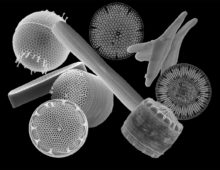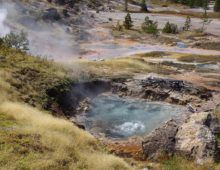Genome Dynamics and Potential Functional Impacts in Fusarium
The fungal genus Fusarium consists of more than 300 phylogenetically distinct species that, collectively, occur as mutualists and/or plant pathogens on virtually all crops. [Read More]
 How Cyanidiophyceae, a group of unicellular red algae that occupies a variety of hot springs and acid mining sites, become extremophiles. [Read More]
How Cyanidiophyceae, a group of unicellular red algae that occupies a variety of hot springs and acid mining sites, become extremophiles. [Read More] Sequencing diatoms for unique insights into their roles as key players for capturing carbon dioxide and as the foundation of diverse aquatic food webs. [Read More]
Sequencing diatoms for unique insights into their roles as key players for capturing carbon dioxide and as the foundation of diverse aquatic food webs. [Read More] This proposal focuses on the unexplored microbial communities in three high-pH geothermal features in Yellowstone National Park. [Read More]
This proposal focuses on the unexplored microbial communities in three high-pH geothermal features in Yellowstone National Park. [Read More]